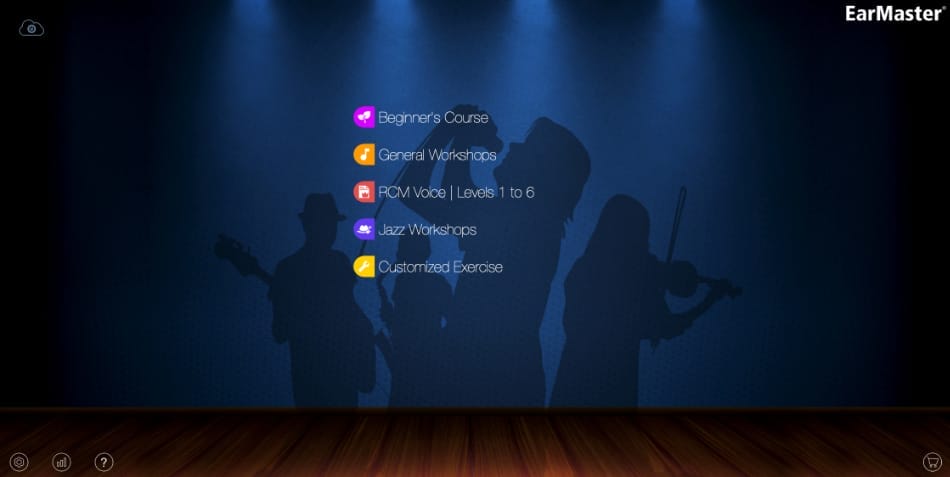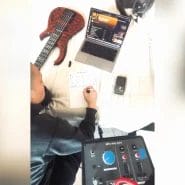One of the most important skills for a musician is ear training. But for some people, it can take a very long time to get their ears to a professional level.
Whether you want to perform live shows, record in the studio, compose, or improvise, you need to have good ears—a functional ear. And to get good ears, you need to develop certain fundamental skills in the best way possible.
I’ve been taught ear training to bass players and improvisers for years. And, the right tools made a huge difference.
Below are my top picks for the best ear-training apps of 2026, along with who they’re best for, why I recommend them, and how they can help you build real relative pitch. These are the two I keep coming back to.
Let’s get to the list.
Disclaimer: I’m reader-supported. So, when you buy through links on my site, I may earn an affiliate commission. Having that said, this article does contain affiliate links that I receive a small commission for at no cost to you. These are the tools I fully recommend when it comes to ear training. You can read my full affiliate disclosure in my privacy policy in the footer.
Best Ear Training Apps (Quick List)
If you want the short version, these are the two best ear training apps of 2026, based on sound quality, musicality, customization, and how well they help you play what you hear:
- EarMaster — Best All-In-One Ear Training App
Great for beginners, intermediate players, music students, and anyone who wants a structured, complete system. - ReelEar — Best Musical Ear Training App
Perfect for improvisers and melody-driven musicians who want real call-and-response training instead of quizzes.
Both apps work for bassists, guitarists, keyboard players, singers, and anyone who wants stronger ears.
Quick Comparison — EarMaster vs. ReelEar
| Feature | EarMaster | ReelEar |
|---|---|---|
| Best For | All-around ear training | Improvisation & call-and-response |
| Training Style | Structured lessons, drills, feedback | Phrase-based, musical responses |
| Skills Covered | Intervals, chords, scales, rhythm, dictation | Phrase imitation, scale/mode vocabulary |
| Musicality | ⭐⭐⭐⭐ | ⭐⭐⭐⭐⭐ |
| Customization | High | Very high |
| Progress Tracking | Yes | Minimal |
| Platforms | iOS, Android, Mac, PC, Chromebook | Browser-based (all devices) |
Which Ear Training App Should You Choose?
Choose EarMaster if you want:
- a complete ear-training curriculum
- clear lesson progressions
- real-time pitch/rhythm feedback
- music theory integration
- interval → scale → chord → dictation all in one place
Choose ReelEar if you want:
- real musical call-and-response
- improvisation-focused training
- melodic phrase imitation
- a “play what you hear” workflow
- scale and mode vocabulary training
If you’re serious about musicianship, use both:
- EarMaster builds fundamentals
- ReelEar turns them into music
What Are the Best Ear Training Apps?
Here are my top picks for the best ear-training apps of 2026, based on musicality, customization, sound quality, and how well they help you play what you hear.
Why These Are the Best Ear Training Apps
- Ease of use: If there’s too much friction when using the app, you simply won’t continue using it. Making noticeable progress with your music ear practice is all about consistency.
- Sound Quality: If the audio samples are poor in quality or abrasive to the ears, you’re not going to enjoy practicing and your skill level will plateau.
- Comprehensive: A good ear is so much more than just being able to identify ascending and descending intervals. Understanding the music theory behind the sounds can help guide the ear. And, a complete variety of chord, scale, and pitch sounds to practice hearing are a must.
- Progress Tracking: Peter Drucker, a management consultant, is often quoted for saying, “If You Can’t Measure It, You Can’t Improve It.” I weighed in each app’s ability to keep track of progress. Keeping track of progress with each exercise will help you find opportunities that can be improved.
- Portability: Since consistent practice is the key to making quick progress, it’s great if the app offered both a desktop and mobile version.
- Instrument sounds: Ideally, the app should have a different instrument sounds, like a piano, synth, violin, saxophone or guitar.
EarMaster Review
Best All-In-One Ear Training App

EarMaster is a great ear training app that provides a complete all-in-one music ear training platform for both individuals and schools. In my personal experience, this is the best ear training ear training app there is.
Every type of exercise for developing a good ear can be performed with EarMaster. From learning to hear the scale degree, to hearing different chord qualities, this app is perfect for the beginner and also pro musicians looking to maintain their skills. EarMaster is a complete ear trainer software and functional ear trainer.
This includes interval identification, functional chord progressions, cadence identification, rhythm workshops that help to improve your timing with sight-reading music notation, chord quality practice like chord identification, hearing a particular scale or mode, singing pitch, music theory, sight-singing, melodic dictation, and more.
If you’re looking for an ear training app that can help you become better at playing by ear, provides a comprehensive list of ear training exercises, allows you to fully customize your training, and level up your aural skills, then Ear Master is for you.
Why EarMaster Is the Best All-In-One Ear Training App
My favorite part is the results and statistics tool that can be used to track your problem areas. This is a great feature that can be used to create a custom lesson or drill on a tough chord, interval, scale, or rhythm.
You’ll learn much faster this way.
With complete features included in their licenses, EarMaster is one of the most used and popular apps for ear training in the market.
I highly recommend this product.

Who EarMaster Is Best For
Musicians at any level who want a comprehensive, customizable platform for ear training, sight-singing, and music theory.
Key Features (EarMaster)
- Interval recognition and chord identification
- Rhythm workshops with notation
- Functional harmony and jazz progressions
- Sight-singing and melodic dictation
- Real-time feedback on pitch and rhythm
- Tracks your progress and adapts lessons
Why I Recommend EarMaster
EarMaster isn’t just packed with features—it’s flexible. Whether you’re focusing on jazz harmony or sight-singing accuracy, you can tailor the app to your goals. I’ve used it for over a decade, and it’s still the most complete system I’ve found.
EarMaster Pros
- Jazz exercises section will teach your ear to hear and learn different chord qualities, functional chord progressions, and rhythmic sight reading—ideal for anyone looking for focused ear training for jazz musicians.
- Multiple choices for your primary instrument preset, between piano, guitar, bass, violin, cello, mandolin, and banjo.
- General workshop section provides the best drills for any type of musician that is learning how to hear chords, scales, progressions, and more.
- The app can evaluate your singing pitch and rhythmic accuracy from musical notation. I haven’t come across any other app that can responds to voice as well as this one.
- Artificial intelligence will stop a lesson early if you’re doing well, and extended it if you’re struggling. It’s like having a personal ear trainer.
- Any lesson is fully customizable.
- I’ve been using EarMaster since 2013 when it was version 6. And now, they’re on 7. Their developers are always working on making this a better product. So many apps I tried in the past died after a couple years. This one is here to stay. It’s literally the most comprehensive ear training app in the market that allows you to focus on specific areas that you want to improve.
- Available for Windows OS, macOS, iOS, Android, and Chromebook devices.
EarMaster Cons
- I’d like to see more functional chord progressions added to the jazz lessons section in the near future.
- It’d be nice if the primary instrument preset also had the option for other sounds, like synth, saxophone, or ukulele.
ReelEar Review
Best Musical Ear Training App

Reel Ear has the most unique and musical ear trainer apps I’ve ever come across.
In the website, there are different web apps for learning to hear melody, arpeggios, harmony, and microtones.
However, I’ve been particularly using the Melody Ear Training app since 2012 when the app was in early development.
I still love it to this day and highly recommend this product to be used alongside your other ear training apps available today.
Why ReelEar Is the Best Ear Training App for Improvisers
With ReelEar, you won’t find quizzes. Instead, you’ll find a range of exercises that are fully customizable and play music phrases based on any scale or mode that you choose.
The phrases are generated when you hit the play button and then played time. Space is given after each phrase for you to play or sing the phrase back.
This is call-and-response and I have never seen any other app do this as well as ReelEar, which makes this one of the best ear training tools on the market.
Call-and-response is at the top of the list of musical skills needed for an improvising musician—which is why I consider Reel Ear the best ear training app for improvisers.

Who ReelEar Is Best For
Improvisers and melody-driven musicians who want to sharpen their call-and-response skills and train their ears in a more musical, phrase-based way.
Key Features (ReelEar)
- Real-time call-and-response training
- Customize scales, modes, and phrase length
- Huge sound bank across multiple instruments
- Cloud-based access across devices
- Focus on phrase recognition over quizzes
Why I Recommend ReelEar
Reel Ear helps you internalize musical phrases in a way no other app does. If you’re trying to build a connection between your ears and your instrument—especially for improvisation—this app builds that bridge.
ReelEar Pros
- You can customize the app to play any scale, chord, or mode.
- This is the only app I’ve come across that teaches via aural call-and-response.
- Huge sound bank to choose from.
- App exists on the cloud. So, if you have an internet connection, you can log into your account and access these apps on any device with a supported browser.
- Since the phrases are played in real time, your ear will learn phrase identification at a much faster pace.
- If you want to learn how to play what you hear, this is the app for just that.
ReelEar Cons
- The interface has a lot of options. At first, this can seem overwhelming.
- There isn’t voice recognition or any sort of feedback loop to tell you if you are right or wrong. These are mainly trainer type of apps.
- There aren’t clear lessons for you to follow. So, you’ll need to already understand the purpose of the app’s design and know what you want to have the trainer do before hand.
Conclusion: Which Ear Training App Should You Choose?
Developing a professional ear takes more than just identifying intervals. Whether you’re a beginner or a seasoned musician, ear training sharpens the most essential skill: playing what you hear—in real time.
In fact, respected institutions like the Smithsonian include ear training as a core part of music theory education—underscoring just how vital these skills are.
EarMaster and Reel Ear are the two tools I recommend most. Together, they offer a powerful combination of lessons and exercises that meet you where you are and grow with you.
Both apps reflect what I look for in any creative system: clarity, customization, and real-world results. They don’t just quiz your ear—they train you to trust it.
Upgrade your musical toolkit with more trusted apps, gear, and tools inside the Gear Reviews category →
Frequently Asked Questions
Are ear training apps actually effective?
Yes. Ear training apps are highly effective when used consistently. The best apps combine interval recognition, chord quality training, real-time feedback, and phrase-based exercises that improve your ability to play what you hear.
Which ear training app is best for beginners?
EarMaster is the best option for beginners because it includes structured lessons, real-time feedback, and a clear progression that teaches foundational skills step by step.
Which ear training app is best for improvisers?
ReelEar is ideal for improvisers because it develops call-and-response recognition, phrase shaping, and ear-to-instrument reflexes—skills that are essential for jazz, funk, and groove-based improvisation.
How long does it take to improve your ear?
Most musicians notice improvement within a few weeks of consistent practice (10–15 minutes per day). Progress depends on how often you practice, what exercises you focus on, and whether you train both active and passive listening.
Do I need musical experience to start ear training?
No. Ear training apps like EarMaster are designed for complete beginners and guide you through the fundamentals of pitch, intervals, scales, and rhythm step by step.
Do ear training apps help with bass playing?
Yes. Ear training builds the ability to recognize chord changes, root movement, melodic contour, and rhythmic placement — all essential for locking in groove and playing bass lines by ear. Strong ears make bass playing feel freer and more intuitive.
Can I train my ear without an instrument?
Yes. Most ear training can be done away from your bass or instrument. Apps that include interval recognition, chord-quality practice, melodic dictation, or call-and-response exercises work anywhere — and often accelerate progress because you’re training pure listening.









